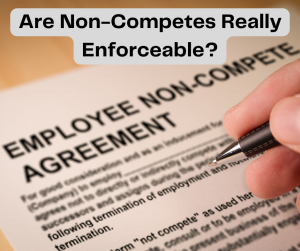Most non-compete agreements between employers and employees violate the National Labor Relations Act, according to a May 30 memo from Jennifer A. Abruzzo, general counsel for the National Labor Relations Board. Such agreements, which bar employees from taking certain types of positions or running certain types of businesses after leaving their current positions, specifically run afoul of Sections 7 and 8(a)(1) of the act, she wrote.
Section 7 provides that employees have a “right to self-organization, to form, join or assist labor organizations, to bargain collectively through representatives of their own choosing, and to engage in other concerted activities for the purpose of collective bargaining or other mutual aid or protection,” Abruzzo noted. As such, under most non-competes, employers engage in an unfair labor practice that violates Section 8(a)(1) because they “interfere with, restrain, or coerce employees in the exercise of the rights guaranteed in [S]ection 7.”
Non-competes “narrowly tailored to address special circumstances justifying the infringement on employee rights” could still pass muster, similar to those that NLRB already allows under severance agreements, but the fact that a current employee might have signed a contract waiving their rights under Section 7 does not make it so, Abruzzo wrote.
If employees could reasonably think that a non-compete effectively bars them from quitting or changing jobs because they could not take a position “based on their experience, aptitudes and preferences as to type and location of work,” that non-compete is too broadly written, she wrote. That’s because, based on the knowledge that they would have difficulty finding a similar position, employees would be chilled from “exercising their statutory rights to organize and act together to improve working conditions,” undermining their bargaining power.
As a corollary to that general principle, such non-compete provisions could chill employees from participating in five specific types of activity protected under Section 7, Abruzzo opined. These include: (1) threatening to resign “in a concerted way” to demand better working conditions, (2) actually carrying out such threats, (3) seeking or accepting employment with a local competitor to gain improved working conditions, (4) soliciting their co-workers to do the same, and (5) engage in protected activity with other workers, such as union organizing.
“This, in my view, the proffer, maintenance, and enforcement of a non-compete provision that reasonably tends to chill employees from engaging in Section 7 activity as described above violates Section 8(a)(1) unless the provision is narrowly tailored to special circumstances justifying the infringement on employee rights,” Abruzzo wrote. Neither the desire to avoid competition from a former employee nor the desire to prior protect investments in employee training qualify as such special circumstances, she added.
Employers do have a legitimate business interest in protecting proprietary information and trade secrets, and the new rule still allows narrowly tailored agreements to do so. But it’s unlikely this scenario would apply to “low-wage or middle-wage workers who lack access to trade secrets or other protectable interests, or in states where non-compete provisions are unenforceable,” Abruzzo noted.
Other provisions that might not violate the National Labor Relations Act include those where employees could not reasonably think they were barred from accepting employment elsewhere, such as “provisions that clearly restrict only individuals’ managerial or ownership interests in a competing business, or true independent-contractor relationships. Moreover, there may be circumstances in which a narrowly tailored non-compete agreement’s infringement on employee rights is justified by special circumstances.” I have written extensively on how these laws and the new Illinois limitations on employee non-competes have impacted the use of non-competes for small busienss owners. The best method to try to protect the employer’s business is to protect its trade secrets.
Small businesses with questions about how to narrowly tailor their non-competes in a way that do not violate this new regulation should contact their business attorney posthaste.
 Chicago Business Attorney Blog
Chicago Business Attorney Blog


